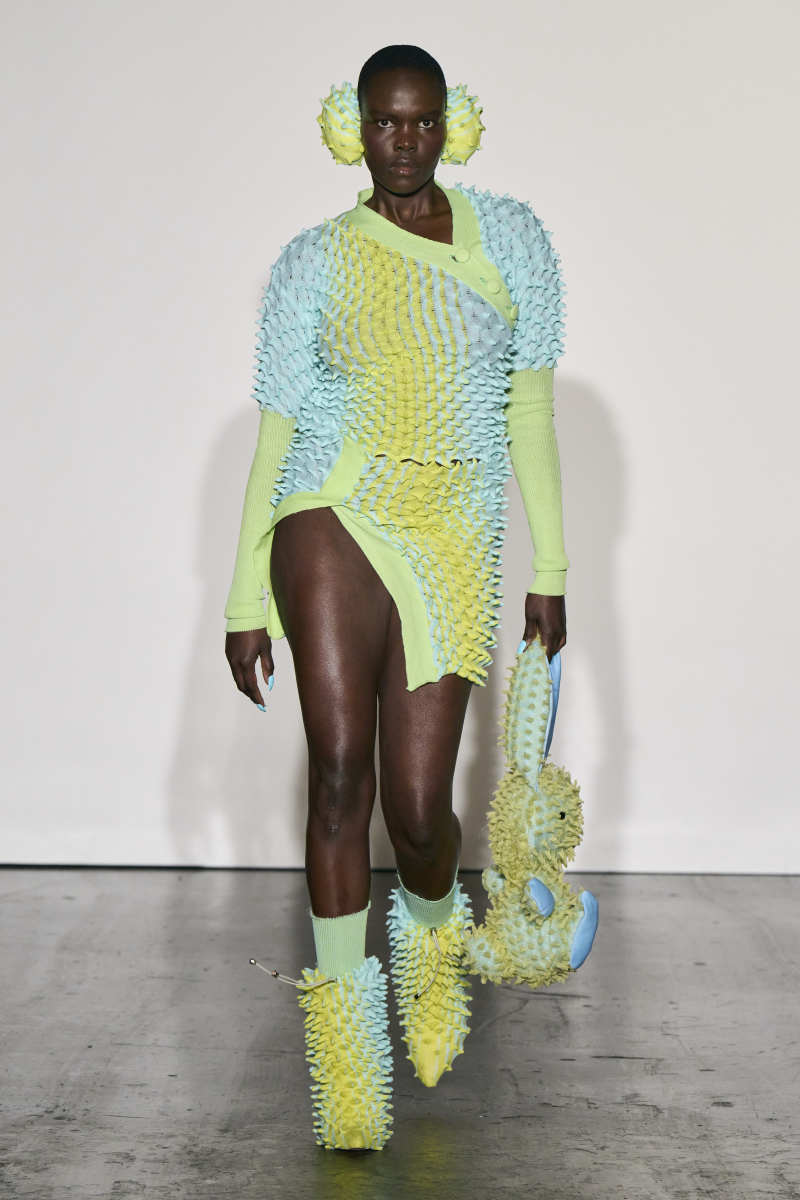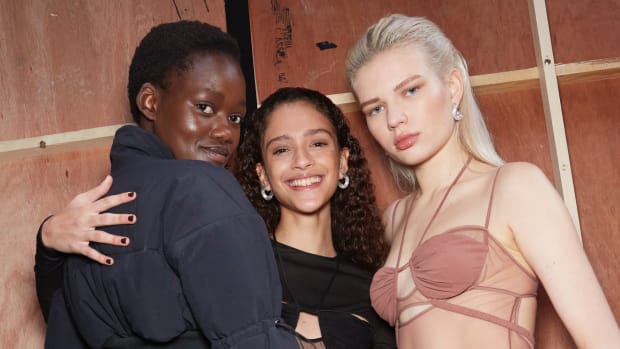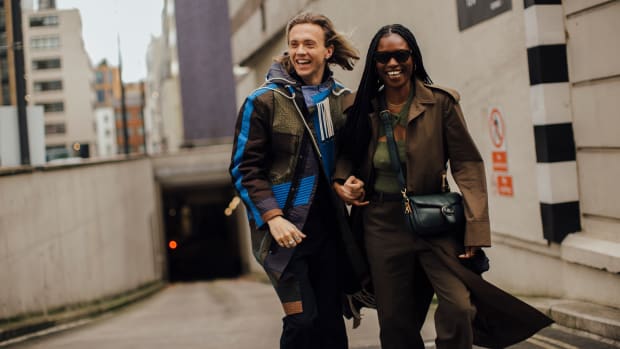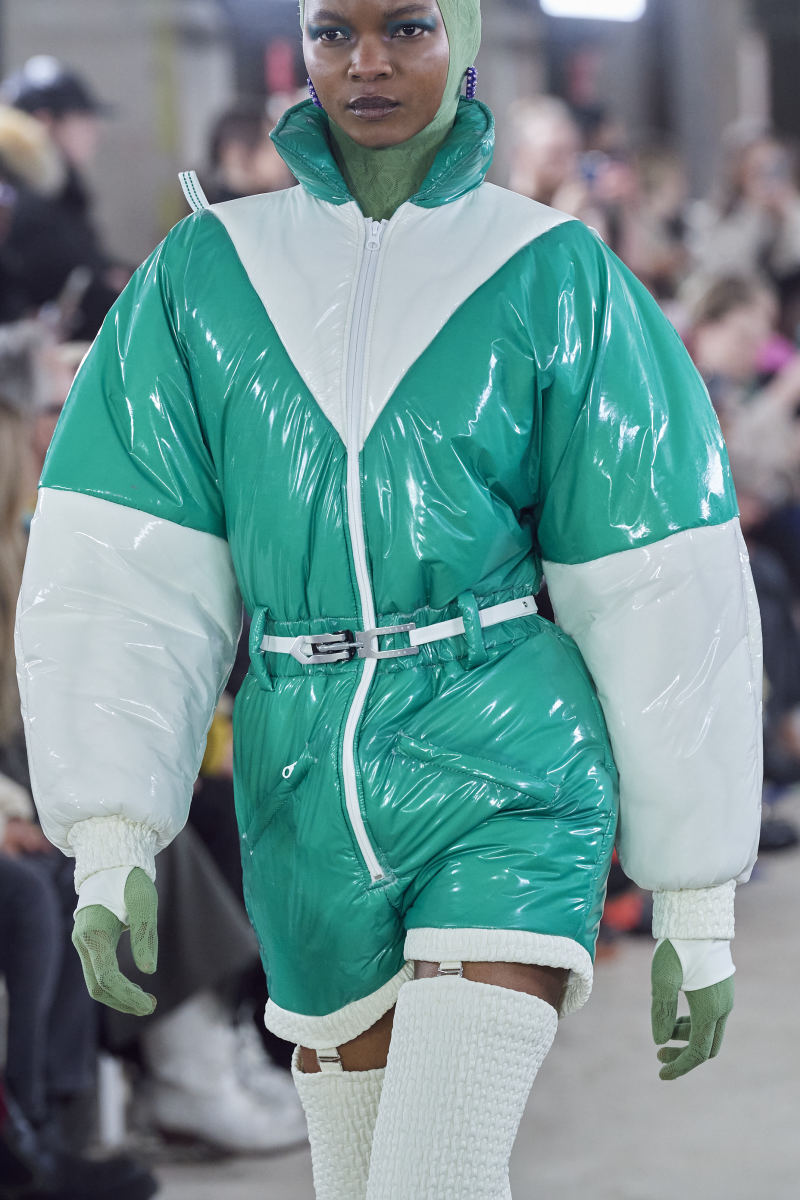Fashion's two-night stand with flesh-bearing fabrics, skin-tight silhouettes and abbreviated hemlines is heating up to the point of a mini-revolution amongst a coterie of emerging talent at London Fashion Week, who
are trading vulnerability for empowerment and modesty for sex appeal.
On Sunday night, Rihanna-favorite Maximilian delivered a swelteringly hot collection as part of Fashion East. The ascendant Maximilian Davis reflects on his Trinidadian heritage, particularly the brazenly feminine wardrobe codes of moonlit island nights in the 1960s.
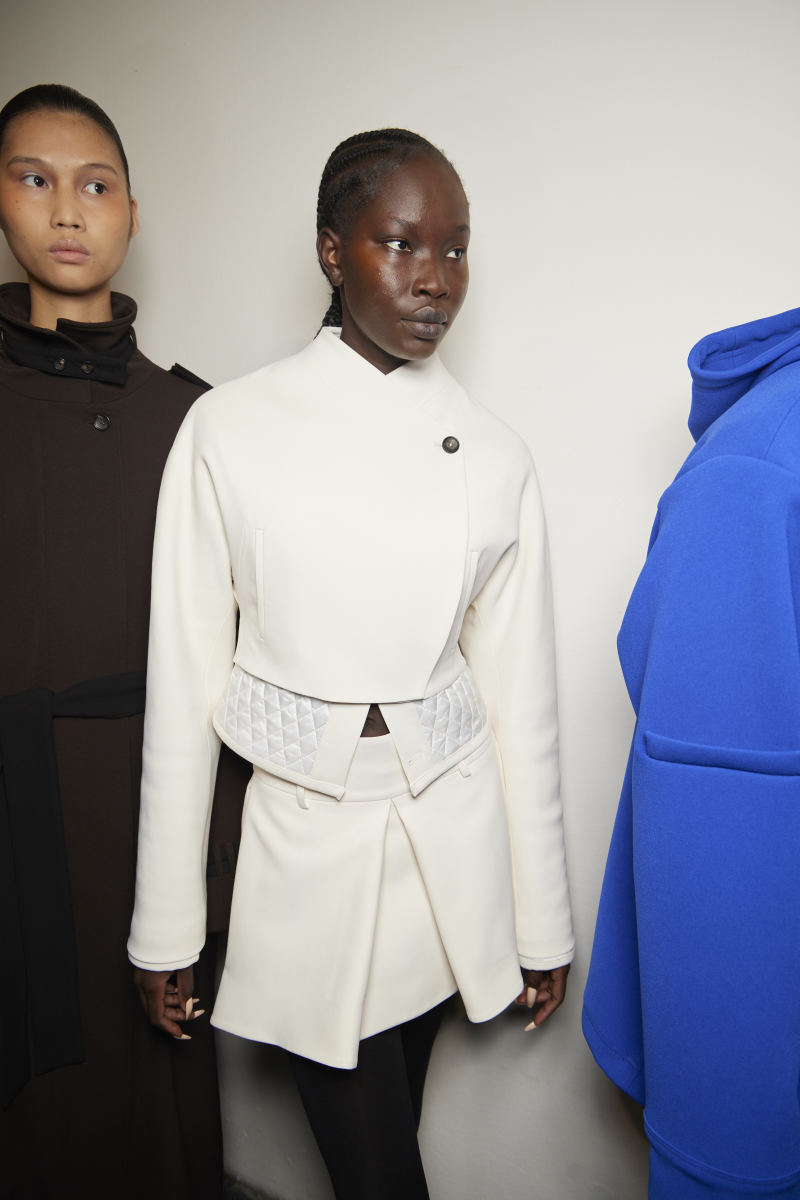
Models for Maximilian's Fall 2022 collection backstage at Fashion East's London Fashion Week show.
Photo: Imaxtree
For Fall 2022, Maximilian pursues a tougher aesthetic that combines British sartorialism with Caribbean equestrianism — but it's no less alluring, with tactile suede and lambskin nappa, vinyl bomber jackets and pleated leather dresses that coyly evoke school uniforms.
Chet Lo, the Asian-American designer melding unfettered sexuality and futuristic knitwear, explores a similar train of thought with "spikes, sex and sportswear": His signature 3-D knitted spiked fabric is thicker and more opaque on skimpy skirts with high asymmetrical slits and marabou-lined crop tops; in an energetic color palette of neon brights, Lo's sensual take is compelling and modern, with comfort and form-fitting silhouettes existing side by side.
Currently, Davis and Lo are part of a wider movement in London expounding the virtues of unabashed expressions of female sexuality and sensuality. After almost two years spent sheltering in place, the youthquake in London is catering to a younger audience eager to make bold statements with bodycon silhouettes and slivers of flesh proudly on display.
"Young London designers are willing to be daring, take risks in their offering and move with the ever-changing zeitgeist," says Heather Gramston, Head of Womenswear Buying at Browns, the luxury retailer based in London.
It's no secret that sexy is well and truly back in favor, following outré outings from designers across all four fashion capitals, from LaQuan Smith and Kim Shui in New York to Versace in Milan to Rick Owens in Paris, among many others over the past few years. In the advent of the #MeToo movement, these creatives have adopted enhanced corsetry, sheer slip dresses and bold latex as a means of conveying strength and self-empowerment. In sum, women's fashion rejected the male gaze in favor of a liberated mentality. In recent seasons, though, the trend has broadened its scope to include 90s-tinged nostalgia influences and sexy-dressing as a welcome alternative to tracksuits and any signifiers of time spent hunkered down during the pandemic.
"Shoppers are seeking something more daring following months of comfort pandemic dressing, and the trend initially emerged as a tonic to 'cozy,' which we had previously lovingly adopted," Gramston says. "It's been something that our customers have outwardly embraced, perhaps down to the varying degrees of the trend."
From a small, subtle amount of skin-baring to extreme cut-out details, micro-minis and striking bodysuits, Gramston found that customers appreciated how this ultra-feminine way of dressing celebrates all bodies: "There are definitely ways in which we can all incorporate a bit of sexy into our wardrobes."
Spearheading the trend is none other than London's latest fêted darling, 2021 LVMH Prize winner Nensi Dojaka. The Albanian designer muses on lingerie as outerwear, landing at the junction of delicacy and strength where revealing slip dresses and slick tailoring converge.
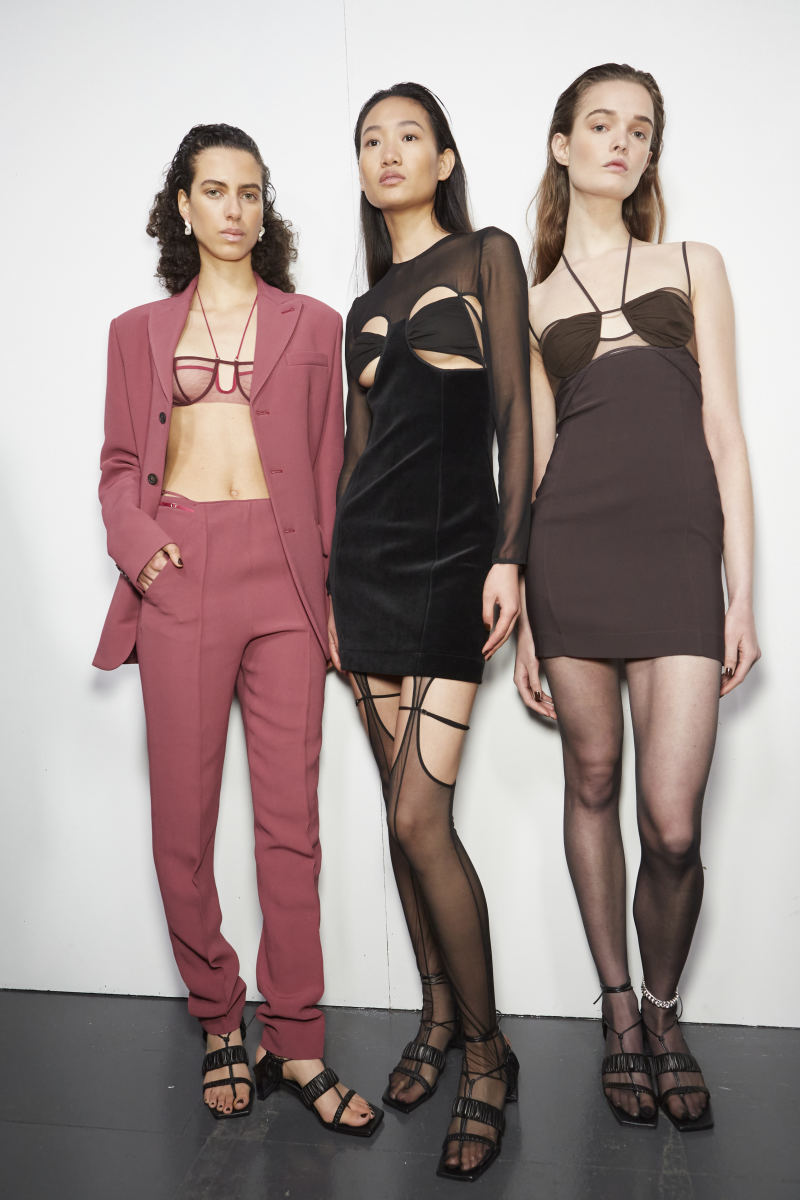
2021 LVMH Prize winner Nensi Dojaka has become one of the most anticipated shows of LFW.
Photo: Imaxtree
Recommended Articles
"Women's rights are a very key topic now, and this is bringing about that sense of liberation," Dojaka says. "On top of that, after the pandemic restrictions, women are more eager to feel sexy and powerful."
Francesca Capper and Natasha Somerville, purveyors of the ultra-feminine and the duo behind London-based label Poster Girl, echo Dojaka's sentiment.
"Being restricted to what you can and cannot wear is often based on others' judgment and ideals, more so than your own. Liberating yourself from this has a strong message, embracing your sensuality and body should be shameless," says Capper, who made her LFW debut with Somerville this season.
At both Dojaka and Poster Girl's Fall 2022 shows, the designers expand on that notion of freedom and self-empowerment. Dojaka's take on lingerie-dressing continues with bralette cups resembling flower petals and body-contouring silhouettes in stretchy fabrics, mini skirts and jumpsuits; for the first time, she includes outerwear, which give her delicate work a robust backbone. Poster Girl, meanwhile, looks to the slopes for inspiration, but turns up the heat with itty-bitty tube dresses, crop tops, neon pink catsuits and crystallized heart-shaped cut-outs. Both presentations felt all the more empowering because of their casting of a range of body types.
That femininity and liberation are meaningful bedfellows is not lost on Supriya Lele, who over the course of three years has quietly and consistently rendered aspects of her South Indian heritage and upbringing in '90s Britain into something sensual, often sexy, but with an edge. There's an ethereal quality to her shimmering chiffons, draped across the body to evoke the sari, adding that bite through palatable, grungy undertones.
At Monday's show (her finest outing yet), Lele's twisted shapes, always painstakingly constructed, meld the sophistication of formal dress with relaxed sportswear and going-out clothes — think low-slung trousers with lacy thongs poking out from underneath — serving sexiness with a side of sassiness.
Elsewhere at LFW, David Koma, the forefather of seductive aesthetics in London, delivers mostly abbreviated hemlines dotted with shimmering Swarovski embellishment and sporty references, with polo shirts transformed into slinky cocktail dresses worthy of the nearest dancefloor. Michael Halpern, a practitioner of glamour and sexiness like no other, shows glittering sequins and flouncy fringe in flamingo pink, lime and gold, inspired by 1970s silver screen icons. Newcomer Conner Ives riffs on Y2K with bright red sequins and skimpy mini dresses at his runway debut.
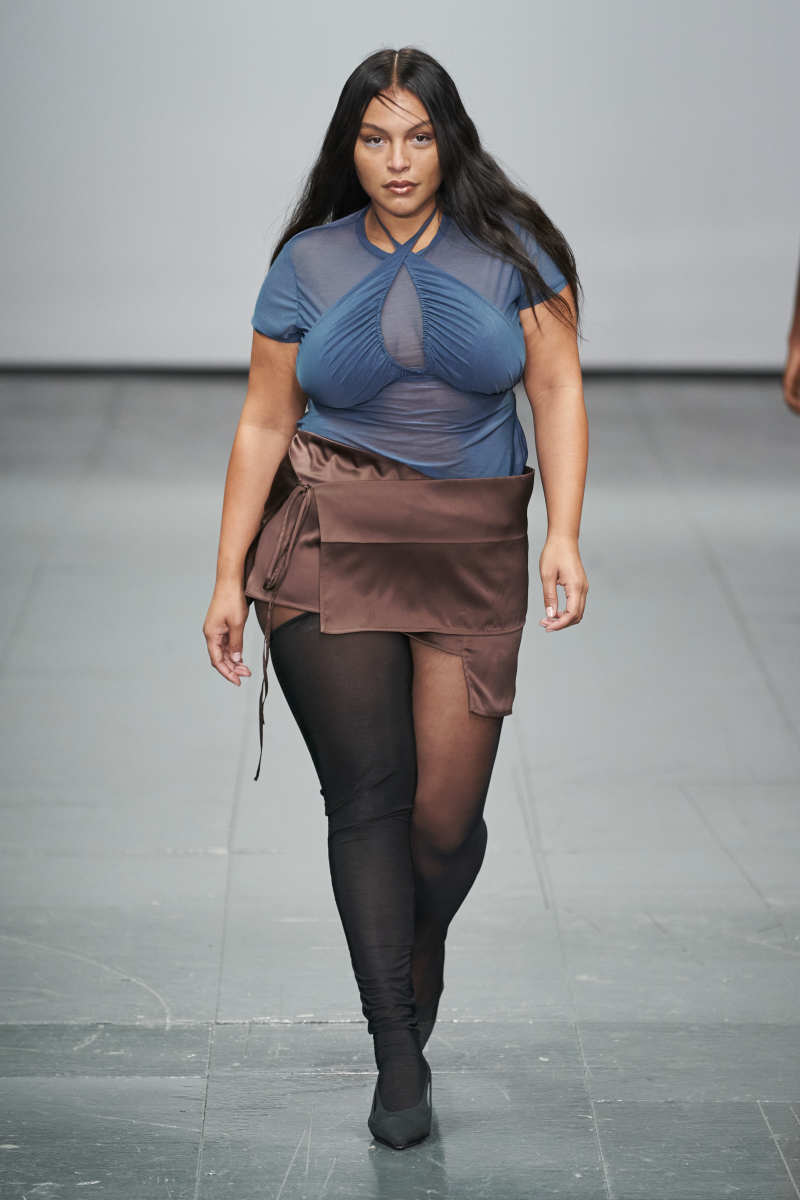
Paloma Elsesser walked many shows this LFW — including Supriya Lele's Fall 2022 runway.
Photo: Imaxtree
Even if the New York collections were largely layered with modesty, London's proponents of body-conscious styles are imbuing fashion with the kind of zest and sex appeal that make shows feel urgent and getting dressed feel essential. (That's true off schedule, too: Brands like KNWLS, Ashley Williams and Mimi Wade court coquettish and often brazen flavors of fashion to communicate the freedom of dressing, with sexuality squarely in mind.)
Despite the tremulous nature of trends, this LFW proved designers are committed to liberating fashion from prosaic minimalism and pandemic trends. To them, sexy is less of a proverbial hook up than it is a partner with potential. This is the time to show up and show out. Moreover, the body-positive approach — from the ever-present Paloma Elsesser to the pregnant Maggie Maurer at Nensi Dojaka — pushed the boundaries for who the trend can resonate with.
"Customers are excited to embrace some glamour again," Gramston says. "And we've all gravitated with force in this direction, with no signs of stopping anytime soon."
Never miss the latest fashion industry news. Sign up for the Fashionista daily newsletter.

